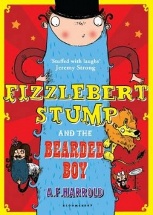Fizzlebert Stump and the bearded boy by A.F. Harrold

Fizzlebert Stump series bk 2, Bloomsbury, 2013. ISBN:
9781408835210. 267 pp.
(Ages: 9-12) A. F. Harrold is an English poet and his love of words
shows in this well-written novel with a fantastic flow. Told in
first person narration by a non-present character the story is
centred on young Fizzlebert Stump and his life with a travelling
circus in Britain. The age-old charm and eccentricity associated
with travelling circuses is captured and mixed in with a great dose
of wit and unpredictability. The acts that travel with the circus
really are one big strange family made complete by Fish the sea lion
who despite his spangly waistcoat doesn't actually do anything in
the circus. In fact he spends his whole time eating and being
disappointed that what he has eaten is not fish.
Fizz lives in the circus with his clown mother and his strong man
father and takes pride in his own act which he performs with the
circus' resident lion. Life is simply fantastic. It even looks like
Fizz has got a friend his own age when the bearded Barboozul family
join the circus with a young son named Wynstan. But then things
start going wrong. His mother loses her nose and as I'm sure
everyone knows a clown is not a real clown without her nose. The
bunny in Dr Surprise's magic act has come down with a terrible case
of diarrhoea. Even Fizz's own act has been compromised. Not to
mention the British Board of Circuses inspector is due at the circus
to decide on its fate. Will the circus be closed down? Will Fizz
have to live in a brick house with the same view from the window
every day and eat boring cabbage and fish fingers for dinner?
This is a charming story with vivid imagery and creative twists and
turns. I really enjoyed the way the author was talking directly to
the reader as if I was sitting in a real-life storytelling session
with A.F. Harrold. This may be reflecting his performing
personality. At times the narrative is directed obviously at the
reader such as 'This particular boy's called Fizzlebert. It's a
silly name, I know' while at others it is included through additions
or bracketed after thoughts such as ('Nobody knows why tiptoeing
people hold their hands up like little paws, but it always seems to
work better that way'). This is a book which celebrates
story-telling as an art. A very fun setting with characters that
burst with possibility for future humourous adventures. I have no
doubt we will see more of Fizzlebert in the future.
Nicole Smith-Forrest